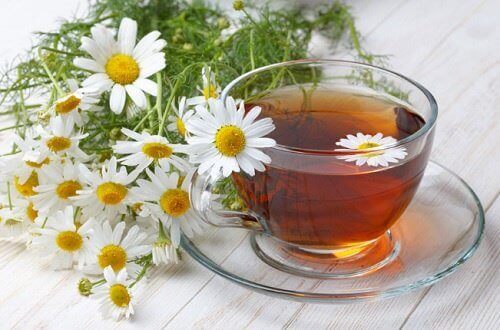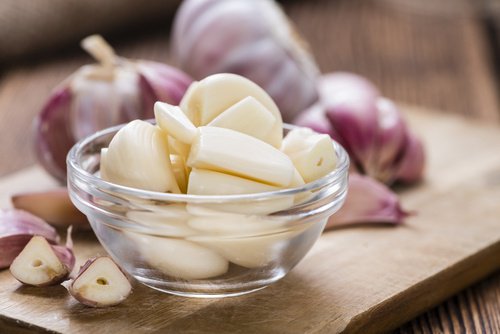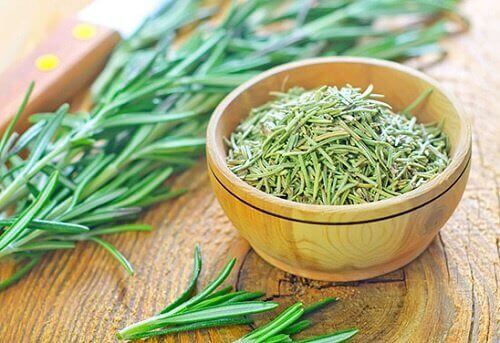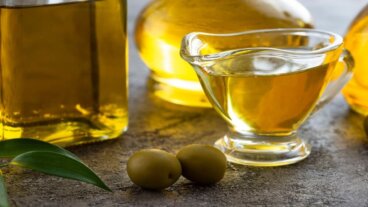Hjernens helse: De beste urtene og krydderne for hjernen

Enkelte medisiner kan være en utmerket hjelp for helsen din. Sannheten er imidlertid at når vi snakker om hva som er veldig bra for hjernens helse, er det noen ganger best å velge de naturlige produktene i stedet.
Lær om de beste urtene og krydderne som vil styrke oksygentilførselen til hjernen din og forbedre hukommelsen din.
Anbefalingene vi tilbyr i dag vil også være nyttige hvis du finner ut at du lider av angst eller trenger beskyttelse mot hjernesvulster på grunn av en familiehistorie med disse problemene.
Vær oppmerksom på denne listen med urter og krydder som alltid bør være på menyen! De ivaretar hjernens helse!
Persille og timian styrker hjernens helse
Både persille og timian inneholder apigenin, en flavonoid som bidrar til å styrke forbindelsene mellom nervene og stamcellene dine.
Du har kanskje ikke hørt om apigenin, men du kjenner sikkert til østrogen. Den kjemiske strukturen av disse to forbindelsene er svært lik fordi østrogen også spiller en rolle i utviklingen av nevronene dine.
Apigenin forårsaker den samme typen positive cellulære endringer som østrogen.
Noen forskere indikerer at et kosthold rikt på apigenin kan påvirke dannelsen av hjerneceller og bedre cellulær kommunikasjon.
Heldigvis er persille og timian blant de beste urtene og krydderne som inneholder dette kjemikalet.
I tillegg til dette, kan disse krydderne bidra til å forebygge depresjon, Alzheimers sykdom og Parkinsons.
Kamille

Hvem har ikke noen poser med kamillete hjemme? Hvis du virkelig liker det, har du akkurat fått nok en grunn til å drikke denne drikken, mens du tilbringer tid sammen med familien din om morgenen. Eller når du bare ser på solnedgangen.
Kamille er blant de beste urtene og krydderne gjennom alle tider. Det er en velprøvd og ekte stresslindrer.
Ikke bare gir den en følelse av fred og ro. Den kan også hjelpe deg med å regulere angsten din. Kamille inneholder forbindelser som bindes til reseptorene av visse kjemikalier i hjernen, og i den samme prosessen reduserer den angst.
Vi anbefaler at du drikker en kopp kamille-te om kvelden før du går til sengs. Dette vil få deg til å slappe av, slik at du kan sove bedre.
Salvie
Når du opplever hukommelsestap, kan det være svært vanskelig å reversere det. Du kan imidlertid fortsatt optimalisere funksjonen.
Hvis du leter etter en liste over de beste urtene og krydderne, vil du ikke gå glipp av den som ser ut til å forbedre hukommelsens ytelse.
Hvis du vil utmerke deg i læring, hukommelse og oppmerksomhet, gjør salvie til en regelmessig del av kostholdet ditt.
Imidlertid bør du være forsiktig når du vurderer ulike kosttilskudd. Spør alltid legen din før du tar kosttilskudd med salvie, da det kan være farlig for enkelte mennesker, for eksempel personer med høyt blodtrykk.
Hvitløk

Hvitløk er ikke en kur for hjernesvulster, som det ble spekulert om i årevis. Imidlertid er hvitløk i stand til å drepe kreftceller i hjernen.
Selv om dette faktum fortsatt trenger mye mer vitenskapelig forskning, er det ingen tvil om at hvitløk skal legges til listen over urter og krydder som hjelper med å ta vare på hjernens helse og hukommelsen.
Den beste delen er at hvitløk kan legges til kostholdet ditt, samtidig som det er en utmerket smakstilsetter.
Mynte
Mynte er en av de beste urtene og krydderne tilgjengelig, så du bør aldri være uten den på kjøkkenet.
Hvis du er en som jobber hardt, vil du ikke ønske å slutte å spise mynte. Denne rike og deilige urten er en fin måte å forbedre hukommelsen på hos friske voksne.
I tillegg er det også en vanlig kur mot kvalme.
Du kan drikke det som en te sammen med kamille og litt honning. Du vil se hvordan du i løpet av 20 minutter får bedre lang- og korttidshukommelse, større aktsomhet og blir i bedre humør.
Hvis du foretrekker noe som en smoothie for energi og næringsstoffer, legg til noen ferske mynteblader til oppskriften din og nyt den forfriskende smaken.
Vi anbefaler å lese:
Slik dyrker du rosmarin, persille og mynte hjemme
Rosmarin

Dette krydderet har en rik essensiell aroma, og bare lukten kan forbedre den prospektive hukommelsen til de som er 65 år eller eldre.
Prospektiv hukommelse refererer til evnen til å huske bestemte hendelser og oppgaver som vil skje i fremtiden. Dette inkluderer avtaler med legen din, jubileum eller bursdager.
Hvis du vil forbedre din prospektive hukommelse, kan du gå for rosmarin!
Denne teknikken har allerede blitt testet i sammenlignende studier av personer over 65 år. De var delt inn i tre grupper der en gruppe av i et rom fylt med lavdendelduft. Gruppe nummer to var i et rom fylt med rosmarinduft, og gruppe nummer tre i et rom uten noen lukt.
Nå som du vet hvilke urter og krydder som tar vare på hjernens helse er det på tide å inkludere de på menyen.
Enkelte medisiner kan være en utmerket hjelp for helsen din. Sannheten er imidlertid at når vi snakker om hva som er veldig bra for hjernens helse, er det noen ganger best å velge de naturlige produktene i stedet.
Lær om de beste urtene og krydderne som vil styrke oksygentilførselen til hjernen din og forbedre hukommelsen din.
Anbefalingene vi tilbyr i dag vil også være nyttige hvis du finner ut at du lider av angst eller trenger beskyttelse mot hjernesvulster på grunn av en familiehistorie med disse problemene.
Vær oppmerksom på denne listen med urter og krydder som alltid bør være på menyen! De ivaretar hjernens helse!
Persille og timian styrker hjernens helse
Både persille og timian inneholder apigenin, en flavonoid som bidrar til å styrke forbindelsene mellom nervene og stamcellene dine.
Du har kanskje ikke hørt om apigenin, men du kjenner sikkert til østrogen. Den kjemiske strukturen av disse to forbindelsene er svært lik fordi østrogen også spiller en rolle i utviklingen av nevronene dine.
Apigenin forårsaker den samme typen positive cellulære endringer som østrogen.
Noen forskere indikerer at et kosthold rikt på apigenin kan påvirke dannelsen av hjerneceller og bedre cellulær kommunikasjon.
Heldigvis er persille og timian blant de beste urtene og krydderne som inneholder dette kjemikalet.
I tillegg til dette, kan disse krydderne bidra til å forebygge depresjon, Alzheimers sykdom og Parkinsons.
Kamille

Hvem har ikke noen poser med kamillete hjemme? Hvis du virkelig liker det, har du akkurat fått nok en grunn til å drikke denne drikken, mens du tilbringer tid sammen med familien din om morgenen. Eller når du bare ser på solnedgangen.
Kamille er blant de beste urtene og krydderne gjennom alle tider. Det er en velprøvd og ekte stresslindrer.
Ikke bare gir den en følelse av fred og ro. Den kan også hjelpe deg med å regulere angsten din. Kamille inneholder forbindelser som bindes til reseptorene av visse kjemikalier i hjernen, og i den samme prosessen reduserer den angst.
Vi anbefaler at du drikker en kopp kamille-te om kvelden før du går til sengs. Dette vil få deg til å slappe av, slik at du kan sove bedre.
Salvie
Når du opplever hukommelsestap, kan det være svært vanskelig å reversere det. Du kan imidlertid fortsatt optimalisere funksjonen.
Hvis du leter etter en liste over de beste urtene og krydderne, vil du ikke gå glipp av den som ser ut til å forbedre hukommelsens ytelse.
Hvis du vil utmerke deg i læring, hukommelse og oppmerksomhet, gjør salvie til en regelmessig del av kostholdet ditt.
Imidlertid bør du være forsiktig når du vurderer ulike kosttilskudd. Spør alltid legen din før du tar kosttilskudd med salvie, da det kan være farlig for enkelte mennesker, for eksempel personer med høyt blodtrykk.
Hvitløk

Hvitløk er ikke en kur for hjernesvulster, som det ble spekulert om i årevis. Imidlertid er hvitløk i stand til å drepe kreftceller i hjernen.
Selv om dette faktum fortsatt trenger mye mer vitenskapelig forskning, er det ingen tvil om at hvitløk skal legges til listen over urter og krydder som hjelper med å ta vare på hjernens helse og hukommelsen.
Den beste delen er at hvitløk kan legges til kostholdet ditt, samtidig som det er en utmerket smakstilsetter.
Mynte
Mynte er en av de beste urtene og krydderne tilgjengelig, så du bør aldri være uten den på kjøkkenet.
Hvis du er en som jobber hardt, vil du ikke ønske å slutte å spise mynte. Denne rike og deilige urten er en fin måte å forbedre hukommelsen på hos friske voksne.
I tillegg er det også en vanlig kur mot kvalme.
Du kan drikke det som en te sammen med kamille og litt honning. Du vil se hvordan du i løpet av 20 minutter får bedre lang- og korttidshukommelse, større aktsomhet og blir i bedre humør.
Hvis du foretrekker noe som en smoothie for energi og næringsstoffer, legg til noen ferske mynteblader til oppskriften din og nyt den forfriskende smaken.
Vi anbefaler å lese:
Slik dyrker du rosmarin, persille og mynte hjemme
Rosmarin

Dette krydderet har en rik essensiell aroma, og bare lukten kan forbedre den prospektive hukommelsen til de som er 65 år eller eldre.
Prospektiv hukommelse refererer til evnen til å huske bestemte hendelser og oppgaver som vil skje i fremtiden. Dette inkluderer avtaler med legen din, jubileum eller bursdager.
Hvis du vil forbedre din prospektive hukommelse, kan du gå for rosmarin!
Denne teknikken har allerede blitt testet i sammenlignende studier av personer over 65 år. De var delt inn i tre grupper der en gruppe av i et rom fylt med lavdendelduft. Gruppe nummer to var i et rom fylt med rosmarinduft, og gruppe nummer tre i et rom uten noen lukt.
Nå som du vet hvilke urter og krydder som tar vare på hjernens helse er det på tide å inkludere de på menyen.
Alle siterte kilder ble grundig gjennomgått av teamet vårt for å sikre deres kvalitet, pålitelighet, aktualitet og validitet. Bibliografien i denne artikkelen ble betraktet som pålitelig og av akademisk eller vitenskapelig nøyaktighet.
- Al-Howiriny, T., Alsheikh, A., Alqasoumi, S., Al-Yahya, M., ElTahir, K., & Rafatullah, S. (2009). Protective Effect of Origanum majorana L. ‘Marjoram’ on various models of gastric mucosal injury in rats. The American Journal of Chinese Medicine, 37(3), 531–545. https://pubmed.ncbi.nlm.nih.gov/19606513/
- Anheyer, D., Frawley, J., Koch, A. K., Lauche, R., Langhorst, J., Dobos, G., & Cramer, H. (2017). Herbal Medicines for Gastrointestinal Disorders in Children and Adolescents: A Systematic Review. Pediatrics, 139(6), 20170062. https://pubmed.ncbi.nlm.nih.gov/28562281/
- Amjad, H., & Jafary, H. A. (2000). Foeniculum vulgare therapy in irritable bowel syndrome: 273. Official journal of the American College of Gastroenterology, ACG, 95(9), 2491. https://www.proquest.com/openview/9a93c6f2b6fc465e6ad08cc7a6d0f7c9/1?pq-origsite=gscholar&cbl=2041977
- Aubert, P., Guinobert, I., Blondeau, C., Bardot, V., Ripoche, I., Chalard, P., & Neunlist, M. (2019). Basal and Spasmolytic Effects of a Hydroethanolic Leaf Extract of Melissa officinalis L. on Intestinal Motility: An Ex Vivo Study. Journal of Edicinal Food, 22(7), 653-662. https://www.ncbi.nlm.nih.gov/pmc/articles/PMC6653806/
- Asgarshirazi, M., Shariat, M., & Dalili, H. (2015). Comparison of the Effects of pH-Dependent Peppermint Oil and Synbiotic Lactol (Bacillus coagulans + Fructooligosaccharides) on Childhood Functional Abdominal Pain: A Randomized Placebo-Controlled Study. Iranian Red Crescent Medical Journal, 17(4), e23844. https://www.ncbi.nlm.nih.gov/pmc/articles/PMC4443394/
- Badgujar, S. B., Patel, V. V., & Bandivdekar, A. H. (2014). Foeniculum vulgare Mill: a review of its botany, phytochemistry, pharmacology, contemporary application, and toxicology. BioMed Research International, 842674. https://www.ncbi.nlm.nih.gov/pmc/articles/PMC4137549/
- Batiha, G. E., Olatunde, A., El-Mleeh, A., Hetta, H. F., Al-Rejaie, S., Alghamdi, S., Zahoor, M., Magdy Beshbishy, A., Murata, T., Zaragoza-Bastida, A., & Rivero-Perez, N. (2020). Bioactive Compounds, Pharmacological Actions, and Pharmacokinetics of Wormwood (Artemisia absinthium). Antibiotics (Basel, Switzerland), 9(6), 353. https://www.ncbi.nlm.nih.gov/pmc/articles/PMC7345338/
- Bensaid, A., Boudard, F., Servent, A., Morel, S., Portet, K., Guzman, C., Vitou, M., Bichon, F., & Poucheret, P. (2022). Differential Nutrition-Health Properties of Ocimum basilicum Leaf and Stem Extracts. Foods (Basel, Switzerland), 11(12), 1699. https://www.ncbi.nlm.nih.gov/pmc/articles/PMC9222536/
- Boeing, T., Mariano, L. N. B., Dos Santos, A. C., Tolentino, B., Vargas, A. C., de Souza, P., Nesello, L. A. N., & da Silva, L. M. (2020). Gastroprotective effect of the alkaloid boldine: Involvement of non-protein sulfhydryl groups, prostanoids and reduction on oxidative stress. Chemico-Biological Interactions, 327, 109166. https://pubmed.ncbi.nlm.nih.gov/32531310/
- Davis, K., Philpott, S., Kumar, D., & Mendall, M. (2006). Randomised double-blind placebo-controlled trial of aloe vera for irritable bowel syndrome. International Journal of Clinical Practice, 60(9), 1080-1086. https://pubmed.ncbi.nlm.nih.gov/16749917/
- Fifi, A. C., Axelrod, C. H., Chakraborty, P., & Saps, M. (2018). Herbs and Spices in the Treatment of Functional Gastrointestinal Disorders: A Review of Clinical Trials. Nutrients, 10(11), 1715. https://www.ncbi.nlm.nih.gov/pmc/articles/PMC6266883/
- Foster, M., Hunter, D., Samman, S. (2011). Evaluation of the Nutritional and Metabolic Effects of Aloe vera. In Benzie I, Wachtel-Galor, S., (Eds.), Herbal Medicine: Biomolecular and Clinical Aspects. 2nd edition. CRC Press/Taylor & Francis. https://www.ncbi.nlm.nih.gov/books/NBK92765/
- Fraternale, D., Teodori, L., Rudov, A., Prattichizzo, F., Olivieri, F., Guidarelli, A., & Albertini, M. C. (2018). The In Vitro Activity of Angelica archangelica L. Essential Oil on Inflammation. Journal of Medicinal Food, 21(12), 1238-1243. https://pubmed.ncbi.nlm.nih.gov/30156459/
- Guo, X., & Mei, N. (2016). Aloe vera: A review of toxicity and adverse clinical effects. Journal of Environmental Science and Health. Part C, Environmental carcinogenesis & ecotoxicology reviews, 34(2), 77-96. https://www.ncbi.nlm.nih.gov/pmc/articles/PMC6349368/
- Gheitasi, I., Motaghi, N., Sadeghi, H., Sadeghi, H., Moslemi, Z., Eftekhari, M., Shakerinasab, N., & Doustimotlagh, A. H. (2021). Antioxidant and Anti-Inflammatory Effects of Origanum majorana L. Methanolic Extract on Bile Duct Ligation in Male Rats. Evidence-Based Complementary and Alternative Medicine: eCAM, 2021, 9927196. https://www.ncbi.nlm.nih.gov/pmc/articles/PMC8121572/
- Ghorbani, A., & Esmaeilizadeh, M. (2017). Pharmacological properties of Salvia officinalis and its components. Journal of Traditional and Complementary Medicine, 7(4), 433-440. https://www.ncbi.nlm.nih.gov/pmc/articles/PMC5634728/
- Grigoleit, H. G., & Grigoleit, P. (2005). Gastrointestinal clinical pharmacology of peppermint oil. Phytomedicine : International Journal of Phytotherapy and Phytopharmacology, 12(8), 607-611. https://pubmed.ncbi.nlm.nih.gov/16121522/
- Hong, S. W., Chun, J., Park, S., Lee, H. J., Im, J. P., & Kim, J. S. (2018). Aloe vera is effective and safe in short-term treatment of irritable bowel syndrome: a systematic review and meta-analysis. Journal of neurogastroenterology and motility, 24(4), 528. https://www.ncbi.nlm.nih.gov/pmc/articles/PMC6175553/
- Ivanov, M., Gašić, U., Stojković, D., Kostić, M., Mišić, D., & Soković, M. (2021). New Evidence for Artemisia absinthium L. Application in Gastrointestinal Ailments: Ethnopharmacology, Antimicrobial Capacity, Cytotoxicity, and Phenolic Profile. Evidence-Based Complementary and Alternative ,edicine: eCAM, 2021, 9961089. https://www.ncbi.nlm.nih.gov/pmc/articles/PMC8324356/
- Jalalipour, M., Yegdaneh, A., Talebi, A., & Minaiyan, M. (2022). Salvia officinalis leaf extracts protect against acute colitis in rats. Research in Pharmaceutical Sciences, 17(4), 350-359. https://www.ncbi.nlm.nih.gov/pmc/articles/PMC9400462/
- Jedidi, S., Selmi, H., Aloui, F., Rtibi, K., Sammari, H., Abbes, C., & Sebai, H. (2022). Antioxidant Properties, Phytoactive Compounds and Potential Protective Action of Salvia officinalis Flowers Against Combined Gastro-Intestinal Ulcer and Diarrhea Experimentally Induced in Rat. Dose-response: a publication of International Hormesis Society, 20(2), 15593258221102313. https://pubmed.ncbi.nlm.nih.gov/35602586/
- Kaithwas, G., & Majumdar, D. K. (2010). Evaluation of antiulcer and antisecretory potential of Linum usitatissimum fixed oil and possible mechanism of action. Inflammopharmacology, 18(3), 137-145. https://pubmed.ncbi.nlm.nih.gov/20405222/
- Kandsi, F., Conte, R., Marghich, M., Lafdil, F. Z., Alajmi, M. F., Bouhrim, M., Mechchate, H., Hano, C., Aziz, M., & Gseyra, N. (2021). Phytochemical Analysis, Antispasmodic, Myorelaxant, and Antioxidant Effect of Dysphania ambrosioides (L.) Mosyakin and Clemants Flower Hydroethanolic Extracts and Its Chloroform and Ethyl Acetate Fractions. Molecules (Basel, Switzerland), 26(23), 7300. https://www.ncbi.nlm.nih.gov/pmc/articles/PMC8659140/
- Khayyal, M. T., el-Ghazaly, M. A., Kenawy, S. A., Seif-el-Nasr, M., Mahran, L. G., Kafafi, Y. A., & Okpanyi, S. N. (2001). Antiulcerogenic effect of some gastrointestinally acting plant extracts and their combination. Arzneimittel-Forschung, 51(7), 545-553. https://pubmed.ncbi.nlm.nih.gov/11505785/
- Kelber, O., Bauer, R., & Kubelka, W. (2018). Phytotherapy in functional gastrointestinal disorders. Digestive Diseases, 35(1), 36-42. https://karger.com/ddi/article/35/Suppl.%201/36/94776/Phytotherapy-in-Functional-Gastrointestinal
- Lazzini, S., Polinelli, W., Riva, A., Morazzoni, P., & Bombardelli, E. (2016). The effect of ginger (Zingiber officinalis) and artichoke (Cynara cardunculus) extract supplementation on gastric motility: a pilot randomized study in healthy volunteers. European Review for Medical and Pharmacological Sciences, 20(1), 146-149. https://pubmed.ncbi.nlm.nih.gov/26813467/
- Li, Y., Chen, Y., & Sun-Waterhouse, D. (2022). The potential of dandelion in the fight against gastrointestinal diseases: A review. Journal of Ethnopharmacology, 293, 115272. https://pubmed.ncbi.nlm.nih.gov/35405251/
- Mashayekhi-Sardoo, H., Razavi, B. M., Ekhtiari, M., Kheradmand, N., & Imenshahidi, M. (2020). Gastroprotective effects of both aqueous and ethanolic extracts of Lemon verbena leaves against indomethacin-induced gastric ulcer in rats. Iranian Journal of Basic Medical Sciences, 23(12), 1639-1646. https://www.ncbi.nlm.nih.gov/pmc/articles/PMC7811806/
- Mayer, B., Baggio, C. H., Freitas, C. S., dos Santos, A. C., Twardowschy, A., Horst, H., Pizzolatti, M. G., Micke, G. A., Heller, M., dos Santos, E. P., Otuki, M. F., & Marques, M. C. (2009). Gastroprotective constituents of Salvia officinalis L. Fitoterapia, 80(7), 421-426. https://pubmed.ncbi.nlm.nih.gov/19481590/
- Makrane, H., Aziz, M., Berrabah, M., Mekhfi, H., Ziyyat, A., Bnouham, M., Legssyer, A., Elombo, F. K., Gressier, B., & Eto, B. (2019). Myorelaxant Activity of essential oil from Origanum majorana L. on rat and rabbit. Journal of Ethnopharmacology, 228, 40-49. https://pubmed.ncbi.nlm.nih.gov/30205180/
- Makrane, H., Aziz, M., Mekhfi, H., Ziyyat, A., Legssyer, A., Melhaoui, A., Berrabah, M., Bnouham, M., Alem, C., Elombo, F. K., Gressier, B., Desjeux, J. F., & Eto, B. (2019). Origanum majorana L. extract exhibit positive cooperative effects on the main mechanisms involved in acute infectious diarrhea. Journal of Ethnopharmacology, 239, 111503. https://pubmed.ncbi.nlm.nih.gov/30217790/
- Micucci, M., Protti, M., Aldini, R., Frosini, M., Corazza, I., Marzetti, C., Mattioli, L. B., Tocci, G., Chiarini, A., Mercolini, L., & Budriesi, R. (2020). Thymus vulgaris L. Essential Oil Solid Formulation: Chemical Profile and Spasmolytic and Antimicrobial Effects. Biomolecules, 10(6), 860. https://www.ncbi.nlm.nih.gov/pmc/articles/PMC7356897/
- Miraj, S., & Alesaeidi, S. (2016). A systematic review study of therapeutic effects of Matricaria recuitta chamomile (chamomile). Electronic Physician, 8(9), 3024-3031. https://www.ncbi.nlm.nih.gov/pmc/articles/PMC5074766/
- Mohanta, B., Sen, D. J., Mahanti, B., & Nayak, A. K. (2023). In vivo acute toxicity, antidiabetic and antiulcer activities of polysaccharide from Linum usitatissimum L. seeds. Food Bioscience, 56, 103195. https://www.sciencedirect.com/science/article/abs/pii/S2212429223008465
- Nikkhah Bodagh, M., Maleki, I., & Hekmatdoost, A. (2018). Ginger in gastrointestinal disorders: A systematic review of clinical trials. Food Science & Nutrition, 7(1), 96–108. https://pubmed.ncbi.nlm.nih.gov/30680163/
- Olagorta, M., Regil, B., Lázaro, M., & Díez, M. A. (2017). Afecciones digestivas: tratamiento fitoterápico. Farmacia Profesional, 31(3), 30-36. https://www.elsevier.es/es-revista-farmacia-profesional-3-articulo-afecciones-digestivas-tratamiento-fitoterapico-X0213932417612245
- Palla, A. H., Khan, N. A., Bashir, S., Ur-Rehman, N., Iqbal, J., & Gilani, A. H. (2015). Pharmacological basis for the medicinal use of Linum usitatissimum (Flaxseed) in infectious and non-infectious diarrhea. Journal of Ethnopharmacology, 160, 61-68. https://pubmed.ncbi.nlm.nih.gov/25433250/
- Panahi, Y., Khedmat, H., Valizadegan, G., Mohtashami, R., & Sahebkar, A. (2015). Efficacy and safety of Aloe vera syrup for the treatment of gastroesophageal reflux disease: a pilot randomized positive-controlled trial. Journal of Traditional Chinese Medicine, 35(6), 632–636. https://pubmed.ncbi.nlm.nih.gov/26742306/
- Patil, S. M., Ramu, R., Shirahatti, P. S., Shivamallu, C., & Amachawadi, R. G. (2021). A systematic review on ethnopharmacology, phytochemistry and pharmacological aspects of Thymus vulgaris Linn. Heliyon, 7(5), e07054. https://www.ncbi.nlm.nih.gov/pmc/articles/PMC8141878/
- Pimentel, M., Bonorris, G. G., Chow, E. J., & Lin, H. C. (2001). Peppermint oil improves the manometric findings in diffuse esophageal spasm. Journal of Clinical Gastroenterology, 33(1), 27-31. https://pubmed.ncbi.nlm.nih.gov/11418786/
- Rtibi, K., Selmi, S., Wannes, D., Jridi, M., Marzouki, L., & Sebai, H. (2019). The potential of Thymus vulgaris aqueous extract to protect against delayed gastric emptying and colonic constipation in rats. RSC Advances, 9(36), 20593-20602. https://www.ncbi.nlm.nih.gov/pmc/articles/PMC9065799/
- Samardžić, S., Arsenijević, J., Božić, D., Milenković, M., Tešević, V., & Maksimović, Z. (2018). Antioxidant, anti-inflammatory and gastroprotective activity of Filipendula ulmaria (L.) Maxim. and Filipendula vulgaris Moench. Journal of Ethnopharmacology, 213, 132-137. https://pubmed.ncbi.nlm.nih.gov/29132911/
- Sarkar, M., & Chawla, P. (2023). Curative Properties of Chamomile in Gastrointestinal Disorders. In M. Goyal (Ed.), Herbs, Spices, and Medicinal Plants for Human Gastrointestinal Disorders (pp. 125-140). Apple Academic Press. https://www.taylorfrancis.com/chapters/edit/10.1201/9781003189749-11/curative-properties-chamomile-gastrointestinal-disorders-mrinmoy-sarkar-pooja-chawla
- Siedentopp, U. (2007). Nutrición: el diente de león. Revista Internacional de Acupuntura, 1(1), 44-46. https://www.elsevier.es/es-revista-revista-internacional-acupuntura-279-articulo-nutricion-el-diente-leon-13108647
- Singh S. (1999). Evaluation of gastric anti-ulcer activity of fixed oil of Ocimum basilicum Linn. and its possible mechanism of action. Indian Journal of Experimental Biology, 37(3), 253-257. https://pubmed.ncbi.nlm.nih.gov/10641155/
- Singh, O., Khanam, Z., Misra, N., & Srivastava, M. K. (2011). Chamomile (Matricaria chamomilla L.): An overview. Pharmacognosy Reviews, 5(9), 82-95. https://www.ncbi.nlm.nih.gov/pmc/articles/PMC3210003/
- Scarpellini, E., Broeders, B., Schol, J., Santori, P., Addarii, M., Boccuto, L., Carbone, F., Abenavoli, L., & Tack, J. (2023). The Use of Peppermint Oil in Gastroenterology. Current Pharmaceutical Design, 29(8), 576-583. https://pubmed.ncbi.nlm.nih.gov/36994979/
- Tarique, M., Siddiqui, H. H., Khushtar, M., & Rahman, M. A. (2016). Protective effect of hydro-alcoholic extract of Ruta graveolens Linn. leaves on indomethacin and pylorus ligation-induced gastric ulcer in rats. Journal of Ayurveda and Integrative Medicine, 7(1), 38-43. https://www.ncbi.nlm.nih.gov/pmc/articles/PMC4910575/
- Veenstra, J. P., & Johnson, J. J. (2019). Oregano (Origanum vulgare) extract for food preservation and improvement in gastrointestinal health. International Journal of Nutrition, 3(4), 43-52. https://pubmed.ncbi.nlm.nih.gov/31080888/
Denne teksten tilbys kun til informasjonsformål og erstatter ikke konsultasjon med en profesjonell. Ved tvil, konsulter din spesialist.








